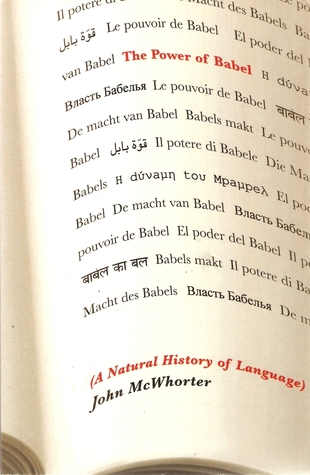

 |

|

The average rating for The Power of Babel: A Natural History of Language based on 2 reviews is 4.5 stars.
Review # 1 was written on 2017-09-24 00:00:00 Brian Mccabe Brian MccabeFor some strange reason, I am fascinated by the study of linguistics. I have read all the books by Stephen Pinker, as well as books by a few other authors on the subject. This book, by linguist John McWhorter, is also fascinating, although his perspective is totally different from that of Pinker. The theme of this book is that languages seem to be analogous to animal and plant evolution. While animals and plants are continuously evolving, there is no "direction". Living species are not becoming more advanced--they are simply changing in response to their environments. Likewise, languages evolve, they split into sub-varieties, they hybridize, the revivify, they evolve functionless features, and they can even be genetically altered. And, languages can go extinct. Most of the world's six thousand languages will go extinct over time. Languages, like biological species, seem to split off from their parents when they are physically isolated from their neighbors. But, with the globalization of trade and cultures, languages nowadays are becoming extinct faster than new ones can develop. One of the points that McWhorter tries to make, is that there actually is no such thing as a true language, only dialects. Each language is made of multiple dialects. As an example, a particular dialect may be spoken in Town A, and residents of Town A can easily converse with speakers of a related dialect in Town B. And, people in Town B can talk with Town C and Town C can talk with Town D. But, people in Towns A and D are totally unable to talk with one another; their dialects are just too dissimilar to be able to converse. So, where is the boundary between dialect and language? McWhorter describes an analogy from the famous Peanuts comic strip. The main character, Charlie Brown, is only six years old, but--he is bald! The question is why? I would not have guessed the reason, which is that in the 1950's, when the comic strip began, baldness was a symbol of dopiness. But since then, the symbolism has been lost. Likewise, original meanings and nuances in languages change over time, until we no longer recognize them. Another main theme in this book is the decorative clutter that builds up in old languages. When you are learning a foreign language, you encounter these Dammit realizations; how are you ever going to learn all these confabulating declensions, cases, tenses, and conjugations! In fact, how can a native-born child ever learn all of this! And, interestingly, the more "primitive" hunter gatherer societies speak languages that are the most complex of all! And why must all this complexity exist? Do languages even need this complexity? The answer is simply, no, this is just the accretion of decorative clutter. But, when the people of two languages meet each other, and a third utilitarian language starts up, a pidgin or a creole language, it is relatively free of all this clutter; this new language contains just enough complexity to be understandable, and no more. For example, there is a pidgin language spoken in Melanesia named Tok Pisin; it sounds like baby-talk English, in that it uses a simple, distorted English as its vocabulary foundation. It has only a single preposition. The future tense is constructed simply by saying "bye and bye". But it is a real language with a real grammar, simple as it is. It is too new to have decorative clutter. If the language does not disappear, it will eventually accumulate decorative clutter. This book is fascinating! It is filled with mild humor and it resonates with examples from today's popular culture. I highly recommend it. |
Review # 2 was written on 2011-09-06 00:00:00 Joseph Canestraro Joseph CanestraroMcWhorter has written a comprehensible, entrancing overview of how language has developed, changed, morphed and been reinvented millions of times in human history. Thanks to MrWhorter, I now know that what I speak and write isn't just English. I speak a dialect of Sydney English circa 2000. What McWhorter achieves here is a fascinating journey through many, many languages (or regional dialects as McWhorter would have it) that span across the globe and time. McWhorter is funny. Despite being a book aiming to impart knowledge, McWhorter's personality, flare and passion for the subject comes across very strongly. Mostly the book is accessible to the layman. Occasionally McWhorter would get ahead of himself and assume a knowledge base of his audience that this little reader didn't have. But for the most part, he translates his knowledge very well across the medium of the written word. Which, may I add, he seems to dislike. It is the only thing I would challenge him (since I'm not educated enough in linguistics to argue effectively on anything else). He views reading and writing as a barrier to language's natural development. With the introduction of the written word, McWhorter claims, English, Chinese, Japanese etc have been developing far more slowly than what they would if they were "wild" and that they've changed to reflect their written versions more than their spoken versions. Whilst I certainly understand a linguist's frustration with this - I think literacy is a valid progression to language. Sure, it is a new and (compared to the long history of spoken language) untried version of language but no less valid than any other dialect of English. Which reminds me that McWhorter's arguments mean that I can no longer deny the friend requests of people who rite liek dis cos thier kool. Maybe he had a point after all... |
CAN'T FIND WHAT YOU'RE LOOKING FOR? CLICK HERE!!!